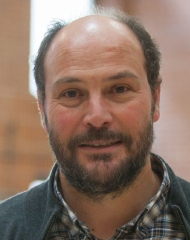The difficulty of 'selling' states of life
Enrique Abad, Oxfam Intermón's representative in Navarra, gave a talk at lecture on volunteer activities international organized by Tantaka.

PHOTO: Manuel Castells
Cooperation today is more changeable than before. In the eighties there was more interest and resources for the cooperative development , but "in the face of the economic crisis there is a negative vision of the organizations and even a certain existentialism onthe part of society". This was pointed out recently at the University of Navarra by Enrique Abad, representative of Oxfam Intermón in Navarra within the cycle of volunteer activities international organized by Tantaka.
The crisis left a resentment in the population and changed, to a large extent, their interest in supporting more immediate causes. "A Spaniard would rather take a kilo of rice to a refugee camp in Greece than support an NGO that works more in the long term deadline", says Abad.
Our daily life is becoming more and more interconnected. The speed with which we live day by day, the constant interconnection to current affairs atrophies our own criteria. It takes us away from the silence and reflection necessary to be aware and active in the face of inequality. Somehow, human suffering in other territories of the planet is alien to our interest. Although we live more connected, we lack a broader vision. And to be able to look broadly and long deadline is not easy. Along these lines, the Oxfam Intermón representative in Navarra comments that it is much easier to sell emergencies where people are at risk than projects that contribute to preventing such situations. In addition, he points out that "many young people are not concerned about social issues because they are not personally affected by them, however there is a minority who are concerned."
To involve more young people, NGOs do not have an easy work . Capturing society's attention and listening implies communicating in an "attractive and fast" way. Abad affirms that "it is not easy because the purpose of an NGO is long-term deadline and sustainable change". International cooperation for development competes to give relevance to projects that take time. So its communication must change. "Cooperation is evolving and we are betting on marketing tools as if we were selling sneakers when what we are really selling are states of life," concludes Abad.
To be able to support a cooperation project is, therefore, to give a state of life. It contributes to improving the quality of life of the most disadvantaged. And being able to participate gives you a space to know and reflect on the needs that others live. Through experiences of cooperation we become more empathetic.




